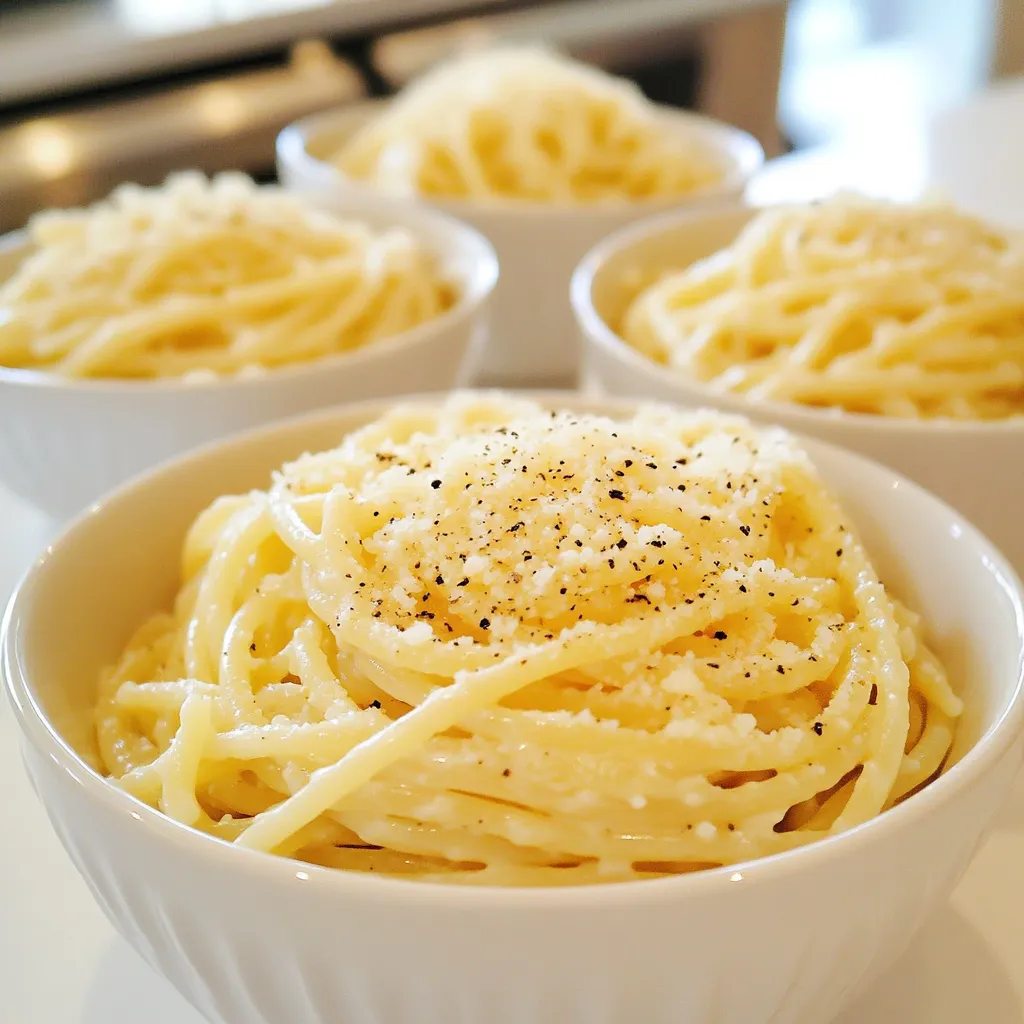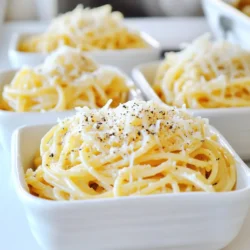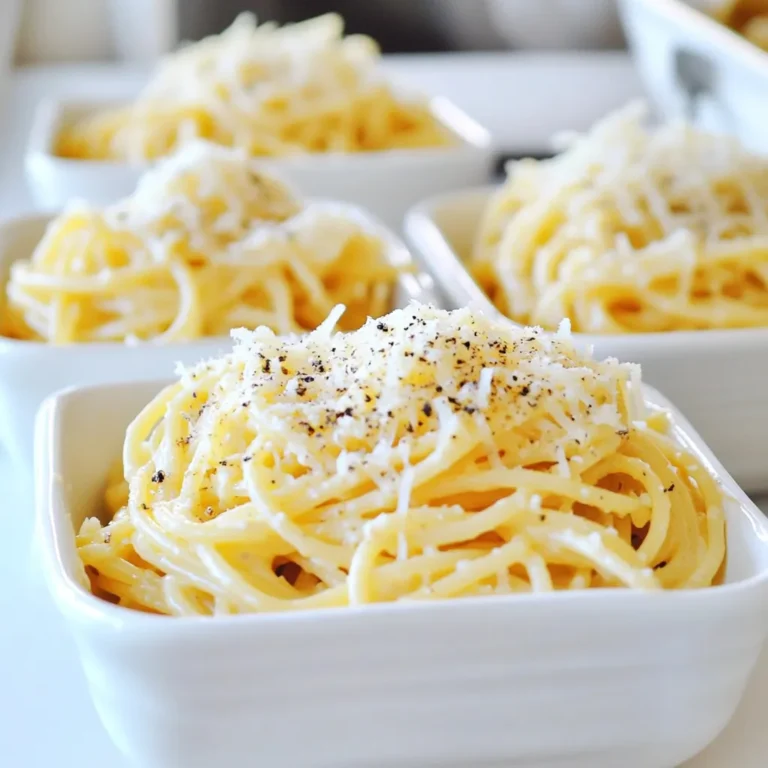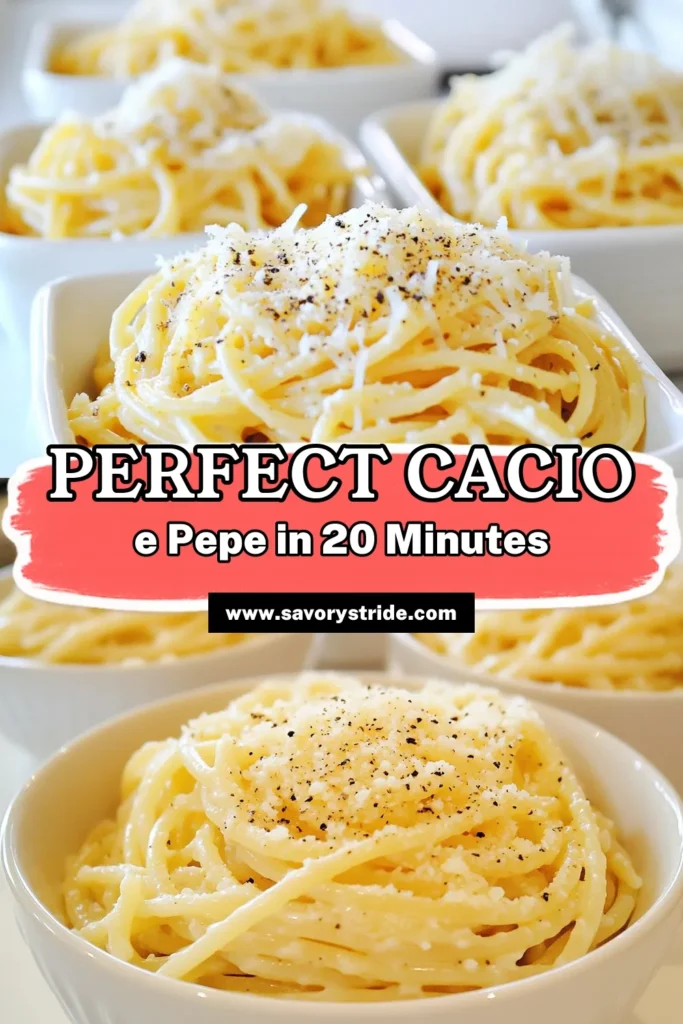Cacio e Pepe is a classic Italian pasta dish and a favorite for many. In my quick and easy recipe, I’ll show you how to make a foolproof version that works every time. With just a few simple ingredients like spaghetti and Pecorino Romano cheese, you can create a creamy sauce that’s full of flavor. Ready to impress your family or friends? Let’s cook!
Ingredients
Main Ingredients List
- 400g spaghetti
- 150g Pecorino Romano cheese, finely grated
- 2 teaspoons freshly cracked black pepper
- Salt, for cooking pasta
- 2 tablespoons pasta cooking water (reserved)
Cacio e Pepe is simple but rich in flavor. To make it, you need just a few key ingredients.
First, select spaghetti. It cooks well and grabs the sauce nicely. You need 400 grams for four servings, so a standard box works perfectly.
Next is Pecorino Romano cheese. Choose 150 grams of finely grated cheese. This cheese gives Cacio e Pepe its creamy texture and salty taste. Freshly grated works best for melting.
You also need freshly cracked black pepper. Use 2 teaspoons for a nice kick. This spice is key to the dish’s flavor profile.
Don’t forget salt for cooking the pasta. It helps season the spaghetti while it cooks. Use a generous amount in the boiling water.
Lastly, save reserved pasta cooking water. You’ll need 2 tablespoons of this starchy water. It helps to bind the sauce, making it creamy and smooth.
With these five ingredients, you can create a delicious and authentic Cacio e Pepe. Enjoy your cooking adventure!
Step-by-Step Instructions
Cooking the Pasta
Start by filling a large pot with water. Bring the water to a boil. Once it is boiling, add a generous amount of salt. This will help flavor the pasta. Next, add the spaghetti to the pot. Cook the pasta according to the package instructions. Aim for al dente, which usually takes about 8-10 minutes.
Preparing the Cheese Mixture
While your pasta cooks, prepare the cheese mixture. In a large mixing bowl, combine 150g of finely grated Pecorino Romano cheese with 2 teaspoons of freshly cracked black pepper. Mix these two ingredients well. Set the bowl aside until the pasta is ready.
Combining Ingredients for the Sauce
Once your spaghetti is cooked, reserve 2 tablespoons of the pasta cooking water. Then, drain the spaghetti in a colander. Remember not to rinse the pasta. This starchy coating is key for making the sauce stick.
Next, add the hot spaghetti directly into the bowl with the cheese and pepper mixture. Toss the pasta quickly to help the cheese melt and form a creamy sauce. If the sauce is not creamy enough, slowly add the reserved pasta water. Stir continuously until you reach a smooth consistency. You can add more pasta water if needed. Taste the dish and adjust with extra salt or black pepper if desired. Toss well so the spaghetti is fully coated in the sauce. Serve hot and enjoy your Cacio e Pepe!
Tips & Tricks
Perfecting the Sauce
The sauce is key in Cacio e Pepe. The starchy coating from the pasta helps the cheese stick. When you cook the spaghetti, don’t rinse it after draining. This starchy coating is what makes the sauce creamy.
When mixing the cheese with the pasta, add the reserved pasta water slowly. Start with a little and stir. This helps you control the sauce’s texture. You want it smooth and creamy, not runny. If it gets too thick, add more water as needed.
Serving Suggestions
Serve the Cacio e Pepe in warmed bowls. Warm bowls keep the pasta hot longer. This small step makes a big difference.
For a nice finish, garnish each bowl with extra cheese and a sprinkle of black pepper. This adds color and flavor. It makes your dish look fancy, too.
Common Mistakes to Avoid
One big mistake is overcooking the pasta. Follow the cooking time on the package for al dente. If you cook it too long, it becomes mushy.
Another mistake is not saving enough pasta water. Always reserve at least two tablespoons. This water helps bind the sauce and pasta. If you forget this step, your sauce may not turn out right.

Variations
Ingredient Substitutions
You can switch up the cheese in Cacio e Pepe for a new taste. Try Parmigiano-Reggiano for a milder flavor. Grana Padano also works well if you want something less salty. For those who need gluten-free options, use gluten-free pasta. Many brands offer great alternatives. Look for ones made from brown rice or lentils. They cook well and taste good too.
Additional Flavor Enhancements
For a garlic kick, add minced garlic to your cheese mixture. Sauté it in a bit of olive oil before mixing. This adds depth and richness. Fresh herbs can also brighten your dish. Chopped parsley or basil makes a lovely touch. Toss them in right before serving for a fresh flavor boost.
Other Pasta Shapes
While spaghetti is classic, other pasta shapes can change the experience. Bucatini, a thicker noodle with a hole in the middle, adds a fun twist. Fettuccine offers a wider surface for the sauce, making it creamy and rich. Explore different shapes to find your favorite version of Cacio e Pepe!
Storage Info
Leftovers
To keep your Cacio e Pepe fresh, cool it down first. This helps stop bacterial growth. Place the pasta in a shallow dish to cool. Once cool, transfer it to a storage container. I recommend using airtight containers. This helps keep the flavors strong and prevents drying out.
Reheating Guidelines
When warming up leftovers, avoid the microwave if you can. Instead, use a skillet on low heat. Add a splash of water or a bit of olive oil. Stir gently until heated through. This keeps the pasta from becoming dry. You want to maintain that creamy texture.
Freezing Cacio e Pepe
Cacio e Pepe can be tricky for freezing. The cheese may not stay creamy after thawing. If you do freeze it, cool the pasta first, then pack it in a freezer-safe container. Make sure to use it within two months. To thaw, place it in the fridge overnight. Reheat in a skillet with a bit of water or oil. This helps bring back its creaminess.
FAQs
What is the origin of Cacio e Pepe?
Cacio e Pepe is a classic Italian dish. It comes from Rome. The name means “cheese and pepper” in Italian. This dish is simple but very tasty. It dates back to ancient times. Shepherds in the region made it with basic ingredients. They used pasta, cheese, and pepper. The dish remains popular today for its rich flavor and ease of preparation.
Can I make Cacio e Pepe without cheese?
Yes, you can create a dairy-free version. Instead of cheese, try using nutritional yeast. This gives a cheesy flavor without dairy. You could also use a vegan cheese alternative. Many brands offer great options made from nuts or soy. Just remember to adjust the salt and pepper to taste.
How do I store leftovers properly?
To store leftovers, let the pasta cool down first. Place it in an airtight container. This helps keep it fresh. Store it in the fridge for up to 3 days. When reheating, add a splash of water. This keeps it creamy. You can use a microwave or stovetop to warm it up gently.
Cacio e Pepe is a simple yet delicious dish. You learned about key ingredients and steps to make it right. I shared tips for perfecting your sauce and suggested fun variations. Remember, avoid common mistakes like overcooking the pasta. With loving care, you can enjoy this classic meal any time. Now, go ahead and make Cacio e Pepe at home! Enjoy the flavors and impress your family with your cooking skills.



